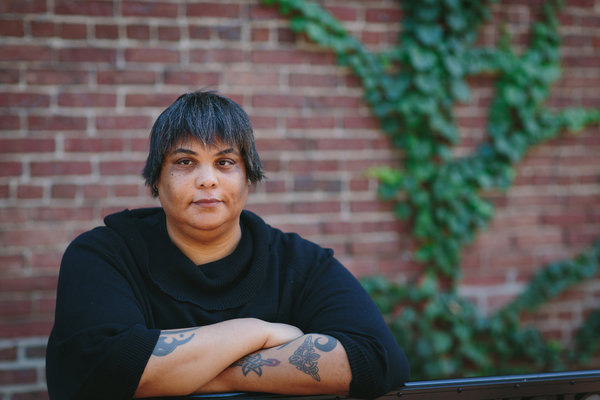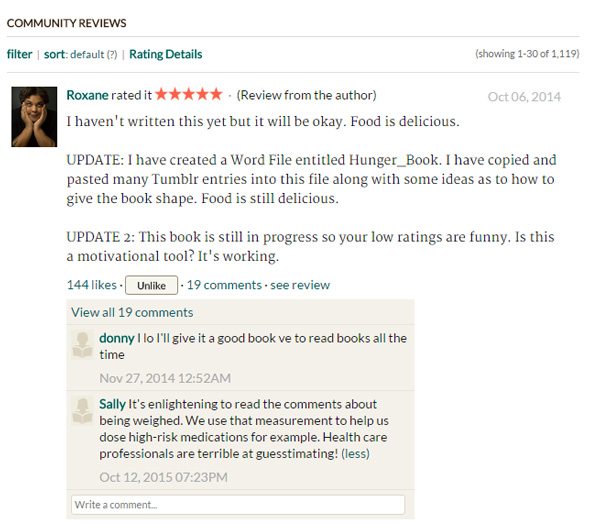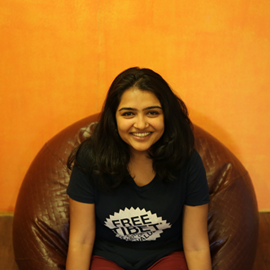Roxane Gay's new book is important because she started writing it fat. And she still is.

I was once fat. I am 5'4, and I once weighed 80 kilos. I can talk about it now with relative abandon, precisely because I'm no longer fat. (I'm not skinny either, just no longer any degree of fat). I've resolved all issues that gave birth to or were born of the fact that I was fat. Parents, dieticians, psychologists and psychiatrists have invested time and thought into ensuring it.
I've also instituted some checks and balances for days when I'm moving in that direction. I own a pair of jeans that I must at all times fit into. And I check. I've learned to eat just a little bit slower. I've learned to wait twenty minutes before I head back to the table for a second helping. I've learned that two cubes of chocolate taste exactly as good as twelve. And I've learned to cultivate a taste for working out.
I've learned to sometimes order in a Dosa when I'm in the mood for Dal Makhni. I've learned to ration myself at buffets. I've learned how important it is to go to a mall trial room every few months and try on clothes that should be my size. And that I should be able to climb three flights of stairs without losing a beat.

These are little skills and tricks that were either taught to me or were hard learnt. And with all this know-how tucked deep inside my back pocket, I feel immune to the danger of ever again being really fat.
Sometimes, just for a laugh, I'll show a colleague or a new friend a photograph of what I looked like at 80 kilos. I'll tell them about the time I skipped a birthday party because I had no clothes I fit into. I will reminisce about the time I related to a character (Chandalika) in a Tagore play, because she was undesirable for being an Untouchable, and I for being fat. And about days I spent obsessing over a BMI calculator that refused to declare me anything but obese.
Also read: Porn-coms are Ekta Kapoor's idea of feminism. That's a big, big problem
I'll gawk at my numerous chins and round fingers in those photographs. I'll also marvel at the girl in it, because it is she, not me, who eventually worked her way out of being fat. I think of my fat self with immense fondness, because in that violent, debilitating, cruel battle with food, she eventually won.
And that's also precisely why I'm quite comfortable talking about it. My fat story isn't an ongoing battle. It is a victory speech. It's easy. I have perspective that comes with distance, and confidence that comes with winning. I have absolute and happy control over the narrative.
Also read: New Internet Phenomenon: women pretending to have been kidnapped
Which is why when I first heard that Roxane Gay - marvellous, honest, path-breaking and still-fat, Roxane Gay - was going to write about being food and weight, I knew how big a deal this really was.
The Extra Shake in Her Ass
For the benefit of those who haven't discovered her yet, Roxane Gay is a feminist who made it okay to be a bad feminist. She's the woman who reminded us that it's okay to be held hostage by horrifying misogynistic rappers (and in our case Honey Singh) because they're catchy. That doesn't make us unfeminist, it only makes us bad feminists.
It's okay to watch trashy films that belittle womankind, read literature that condones patriarchy and sometimes let the men move the furniture and repair the sink. It's okay to be a bad feminist, as long as we're working towards becoming better ones.
She helped us separate the flawed feminism that is ours, from the ideal Feminists we must all aspire to be. And as long as we're still feminists (lower case f) hobbling towards Feminism, it's better than not being feminists at all.
Her previous book, Bad Feminists, talks about much of this. It even touches upon her battles with weight, in a chapter called Reaching for Catharsis. In it, she talks briefly about how she came to being fat:
"There was an incident with some boys in the woods, and suddenly, I was stuffing my face with Twinkies or ordering a pizza late at night, trying to fill this ragged ugly thing inside me that couldn't be filled or quieted. I ignored my parents and their worry entirely. All I wanted to do was eat. My body grew, became more significant, more noticeable and more invisible at the same time. Most important though, the bigger I made my body, the safer I felt. Bad things, I'd decided earlier, could not happen to big bodies. I was not necessarily incorrect in my thinking. Eating was, in part, a survival instinct."
Hunger, Gay's book which is scheduled for release in June 2016, deals more deeply in this. She hasn't explored the "incident" in the woods precisely yet, so we can assume she will delve into it with characteristic honesty there.

That her weight is linked with the abuse and trauma that happened in the woods isn't novel. Most obesity is linked to trauma and a body's failing response to it.
Also read: The Nobel laureate who wrote about an onion: the witty genius of Wislawa Szymborska
But a victim of abuse willing to speak about the weight she gained because of trauma - particularly weight she hasn't lost yet - that's new. That's also profoundly brave.
Because that's no victory speech. Nor inspiring tale of coming-of-age or fighting-the-odds. That is just badass.
Fat is a scar you cannot hide
There's a ladies restroom moment that few of us will be able to escape in our lifetimes. The cribbing-about-flabby-arms-in-front-of-the-mirror-between-drinks moment. Where one friend will complain about her arms or double chin or whatever is plaguing her momentarily. And the other, fatter friend, will unconvincingly express sympathy, because she isn't sure what else to say.
I've been both people in that conversation. At 80 kilos, I've watched my considerably slimmer friends berate themselves for love handles I could not see. And at 55 kilos, I've expressed unhappiness with my perfectly healthy body around my larger friends. Both times, I have been aware of how silly all those complaints were.
Also read: Bartender's Sketchbook is the best thing we've seen on Instagram recently
They're silly because 3 extra kilos is simply not the same as 30 extra kilos.
Gay explains it herself:
"The body is a personal territory and every person's weight struggle should be taken seriously, but there's overweight and there's overweight. If you're the latter, it is difficult to take the former seriously, right or wrong."
It is important, then, that a book about weight-issues be written by someone who is taken seriously by people struggling with obesity. Not by the formerly-obese. Nor by the medium-sized with pop-culture-fuelled insecurities.
But by a hardy, passionate, and still-fat, Roxane Gay.
Also read: Cities of Sleep: this may be the most important film of the year







![BJP's Kapil Mishra recreates Shankar Mahadevan’s ‘Breathless’ song to highlight Delhi pollution [WATCH] BJP's Kapil Mishra recreates Shankar Mahadevan’s ‘Breathless’ song to highlight Delhi pollution [WATCH]](https://images.catchnews.com/upload/2022/11/03/kapil-mishra_240884_300x172.png)

![Anupam Kher shares pictures of his toned body on 67th birthday [MUST SEE] Anupam Kher shares pictures of his toned body on 67th birthday [MUST SEE]](https://images.catchnews.com/upload/2022/03/07/Anupam_kher_231145_300x172.jpg)






